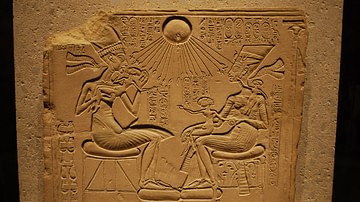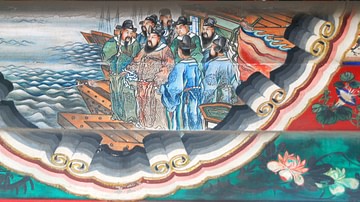Search
Search Results

Definition
Tsar
Tsar (also czar) is a Slavic term derived from the Latin caesar. Ivan III (Ivan the Great) (r. 1462-1505) was the first Russian ruler to begin using the title of tsar during his reign instead of the title Grand Prince of Moscow. His grandson...

Definition
Amarna
Amarna is the modern Arabic name for the site of the ancient Egyptian city of Akhetaten, capital of the country under the reign of Akhenaten (1353-1336 BCE). The site is officially known as Tell el-Amarna, so-named for the Beni Amran tribe...

Definition
Cao Cao
Cao Cao (c. 155-220 CE) was a military dictator in ancient China during the end of the Han dynasty. Something more than a mere warlord, Cao Cao supported a puppet emperor and governed a large area of northern China. His attempts to unify...

Definition
Grand Remonstrance
The Grand Remonstrance of 1641 was a list of grievances issued by Parliament against King Charles I of England (r. 1625-1649). It recorded what Parliament saw as the monarch's abuse of power, his illegal raising of taxes outside Parliament...

Definition
Hellenistic Warfare
When Alexander the Great died in 323 BCE, he left behind an empire devoid of leadership. Without a named successor or heir, the old commanders simply divided the kingdom among themselves. For the next three decades, they fought a lengthy...

Definition
Roman Army
The Roman army, famed for its discipline, organisation, and innovation in both weapons and tactics, allowed Rome to build and defend a huge empire which for centuries would dominate the Mediterranean world and beyond. Overview The Roman...

Definition
Einsiedeln Abbey
Einsiedeln Abbey and Monastery (German: Kloster Einsiedeln), located some 31 km (19 mi) southeast of Zürich at the foot of a hill in the town of Einsiedeln in Canton Schwyz, Switzerland, is the most important site of Roman Catholic pilgrimage...

Article
The Murder of the Romanov Family
The brutal murder of the entire Romanov family was the culmination of deep discontent across the Russian Empire with the persistently autocratic rule of Tsar Nicholas II (reign 1894-1917). Following the disaster of the First World War (1914-18...

Article
The Elizabethan Religious Settlement
The Elizabethan Religious Settlement was a collection of laws and decisions concerning religious practices introduced between 1558-63 CE by Elizabeth I of England (r. 1558-1603 CE). The settlement continued the English Reformation which had...

Article
The Assassination of Julius Caesar
Veni, vidi, vici! This was the simple message the Roman commander Julius Caesar sent to the Senate in Rome after a resounding victory in the east against King Pharnaces of Pontus - a message that demonstrated both arrogance as well as great...